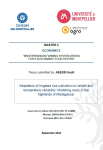Abessi H. (2024).
Adaptation of irrigated rice cultivation to rainfall and temperature variability: modelling study in the highlands of Madagascar. Mémoire (Master 2 MIDAS) : CIHEAM-IAMM, Montpellier (France). 96 p. Master 2 Thesis. Economics. Programme: Mediterranean farming system design for a sustainable food-system [MIDAS]. Co-accreditation University of Montpellier, Institut Agro Montpellier, CIHEAM-IAMM.
| Titre : | Adaptation of irrigated rice cultivation to rainfall and temperature variability: modelling study in the highlands of Madagascar |
| Auteurs : | H. Abessi |
| Type de document : | Thèse, Mémoire, Master |
| Année de publication : | 2024 |
| Format : | 96 p. |
| Note générale : | Master 2 Thesis. Economics. Programme: Mediterranean farming system design for a sustainable food-system [MIDAS]. Co-accreditation University of Montpellier, Institut Agro Montpellier, CIHEAM-IAMM. |
| Langues : | Anglais |
| Langues du résumé : | Anglais ; Français |
| Catégories : |
Catégories principales 06 - AGRICULTURE. FORÊTS. PÊCHES ; 6.4 - Production Agricole. Système de ProductionThésaurus IAMM RIZ ; RESILIENCE ; CHANGEMENT CLIMATIQUE ; PRATIQUE AGRICOLE ; MADAGASCAR |
| Résumé : |
The study reviews the adaptation of rice crops under rainfall and temperature’s fluctuations in the highlands of Madagascar. Being included in the DINAAMICC research and development project, this study’s objective is to assess producers’ situation and the challenges they’re facing caused by climate change to assist them with recommendations depending on agroecological practices and adjusted varieties to enhance farm rice system’s productivity and sustainability.
The highlands of Madagascar, represents an important pilar in rice cultivation’s economics, are facing turbulent impacts due to climate variability, especially within the early season of rainfall. This research works to understand the critical relationships between rice crop and climate variability and to recognize potential strategies that enhance farm’s resilience to climate unpredictability. Historical climate data and on-site agronomic survey data (collected for the 2023/24 season) were employed. It investigated the interconnection between crops schedules, cultivar traits and realistic climatic stats via crop modelling. Agronomic data analysis was used to set a varietal typology that had been used later to parametrize accurate varietal types for modelling. Next, a series of simulations were run using the SAMARA@Cirad model on weather data to investigate the possible performances and risks linked to various agronomic configurations: Varietal type x sowing date x nursery duration x water x soil x climatic years. To explore further adaptation possibilities, hypothetical ideotypes varieties were created from the basic traits of existing cultivars but with enhances performances. This research aims to elaborate constructive insight and recommendations to assure a sustainable rice production systems in agricultural practices in Madagascar. |
| Nature du diplôme : | Mémoire (Master 2 MIDAS) |
| Université de soutenance : | CIHEAM-IAMM |
| Ville de l'université de soutenance : | Montpellier (France) |
| Cote : | Réservé lecteur CIHEAM |
| Directeur de Thèse : | Belhouchette H. |
| Membres du Jury : | Bourceret A.; Dingkuhn M.; Muller B.; Belhouchette H. |







